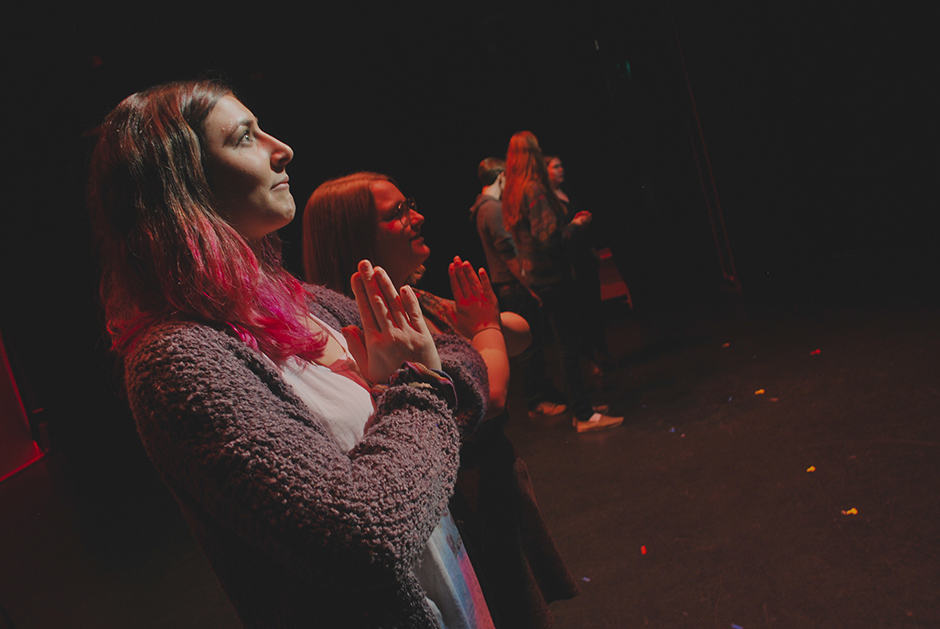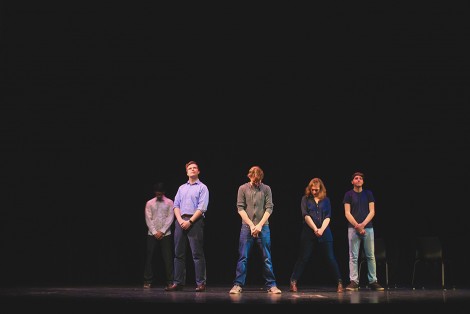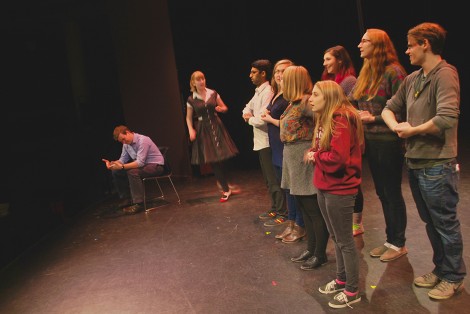Ghosts roamed Isabel Bader Theatre’s stage as I sat down to talk with The Bob’s co-directors Talal Itani and Emma Robinson. The rehearsals for opening night ran until midnight, and the air was filled with the buzz of excitement. The Bob a Victoria University tradition, Canada’s longest running sketch revue, now 142 years old. It took place this weekend from Novemer 27 to 29. It’s a student-written revue directed not just towards the collegiate audience, but Toronto as a whole. The show ran for an hour and a half, filled with original content written by the cast themselves. I spoke to the co-directors about their experiences in getting involved in sketch comedy and how they put together a show.
The Varsity: What got you into sketch comedy?
Emma Robinson: We have really similar tastes. Shows like Monty Python, STV and The Upright Citizens Brigade in New York really influenced our love for sketch comedy.
Talal Itani: Other comedy inspiration definitely includes The Simpsons and Kids in the Hall. I like that off-beat humour.
ER: We like that logical absurdity. That’s what we’re about at The Bob. We don’t believe in mean-spirited comedy, but rather something that draws from aspects of life people can connect with… A sketch comedy show does exactly what the name suggests. It’s a show filled with a series of short comedy scenes; it’s Saturday Night Live on the stage. But creating a sketch comedy show from scratch isn’t something you can just do the night before, like your 10-page paper.
TV: So what’s the process of making a sketch comedy show?
ER: It all starts in September, after the audition process, of course. The cast members get a chance to pitch ideas to us. Then we develop and critique those. That’s a month and a half long process.
TI: In auditions, we give someone an old SNL sketch and see how they deliver one-liners or an ongoing joke. It’s all about comedic timing; that’s the key to comedy. Practice and the perfect timing of a line.
ER: Then it’s rehearsals, rehearsals, rehearsals. We fine-tune, while the tech comes in to set up things like lighting.
TV: How do you decide which sketches work?
ER: In November, we narrow down the sketches down to the ones Talal and I find would work best in the show. This year, we started with 45 pitches and narrowed it down to 22.
TI: We look at the premise of the writing, and whether they read well during table reads in the first month of development. Emma and I also take feasibility and the cohesive tone into consideration. It’s important we make sure everyone has a chance to pitch their ideas and develop them.
ER: We take both short and long sketches, because we want the show to flow together. So when we make the transition between long sketches and have to change the set, there are still short sketches happening in front of the curtain. The audience will always be entertained without feeling they’re being droned on.
TV: What’s the biggest challenge that you face?
TI: I think it’s making sure everyone gets heard. People may feel like they’re being underappreciated in any group environment, so here we make sure they’re always appreciated. Our cast works so hard, and that starts with them having the chance to pitch their ideas freely without feeling intimidated or judged.
ER: It’s important we make sure everyone gets a fair chance and fair share at opportunities. There are even first years here who have opened up because they get this fair chance at pitching ideas.
TI: Once we make sure of that, we all work hard together, which makes us such a tight cast.
TV: It’s exam time. There are a bunch of assignments, tests, and exams happening right now that are leaving students at U of T overstressed. Why would they take the time out to come and see The Bob instead of reading another chapter?
ER: Laughter is a proven medical stress reliever. Not only are you getting a good laugh, but you won’t have to think about [school] while watching us. We’re not creating content just for university students, but writing that expands beyond that, to everyday life we all experience. I like writing about social critiques, like the parent, or the douchey guy at a club.
TV: What surprises are in the show this year?
ER: We actually have a legit musical number. Like something out of Broadway. Except it’s more of a parody of every Broadway cliché.
TI: All of the music was composed ourselves. One of our cast members specializes in composition; it’s amazing what they created.




